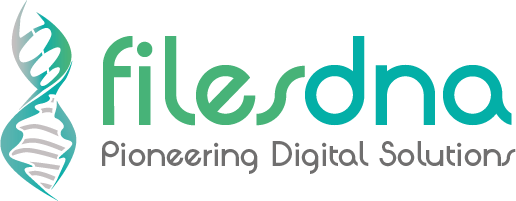Healthcare

Transforming Healthcare with FilesDNA
A Comprehensive Solution for Modern Challenges
In today’s fast-paced world, the healthcare industry is embracing technology to meet the demands of patient care, compliance, efficiency, and collaboration. FilesDNA is at the forefront of this revolution, offering a wide range of services including document management system, e-signature, electronic signature, electronic forms, smart survey system, file management system, and automation. Here’s how FilesDNA’s suite of tools is reshaping the future of healthcare.
Document Management System
Healthcare organizations handle an enormous volume of documents daily. From patient records to insurance documents, the management of these files is crucial. FilesDNA’s document management system offers a seamless way to store, retrieve, and manage documents electronically, ensuring accuracy, efficiency, and compliance with regulations.
E-Signature and Electronic Signature
Getting signatures on medical documents is a routine but vital task. FilesDNA’s e-signature and electronic signature solutions provide a secure and convenient way for healthcare professionals and patients to sign documents electronically, thereby accelerating processes and ensuring authenticity.
Electronic Forms
Paper forms can be cumbersome and error-prone. FilesDNA’s electronic forms transform the way healthcare providers gather information, from patient intake to consent forms. These customizable forms streamline data collection, reducing administrative burden, and enhancing patient experience.
Smart Survey System
Understanding patient satisfaction and collecting feedback is key to continuous improvement in healthcare. FilesDNA’s smart survey system enables healthcare providers to design, distribute, and analyze surveys effortlessly. This real-time feedback mechanism informs decision-making and improves patient care quality.
File Management System
Managing various file types across departments requires an organized system. FilesDNA’s file management system enables healthcare professionals to keep all documents systematically organized. Whether it’s a medical image, a prescription, or a patient’s history, all files are easily accessible, enhancing collaboration and efficiency.
Automation in Healthcare
FilesDNA’s automation solutions offer healthcare providers the ability to automate various administrative tasks. From scheduling appointments to billing, automation ensures accuracy, saves time, and allows healthcare professionals to focus on what matters most: patient care.
FilesDNA: A Partner in Healthcare Innovation
1. Security and Compliance
In healthcare, data security and regulatory compliance are paramount. FilesDNA’s solutions are built with the highest security standards, ensuring patient confidentiality and compliance with regulations such as HIPAA.
2. Integration and Scalability
FilesDNA seamlessly integrates with existing healthcare systems and can be scaled to meet the needs of different healthcare facilities, whether small clinics or large hospital networks.
3. Accessibility and Mobility
FilesDNA’s cloud-based solutions provide accessibility across various devices and locations. Healthcare professionals can access vital information at their convenience, improving responsiveness and patient care.
Conclusion
Healthcare is a dynamic and complex field that requires innovative solutions to meet the demands of modern medicine. FilesDNA offers a comprehensive suite of tools, including a document management system, e-signature, electronic signature, electronic forms, smart survey system, file management system, and automation, to address these challenges.
With FilesDNA, healthcare providers can streamline processes, enhance collaboration, ensure compliance, and deliver exceptional patient care. Embrace the future of healthcare with FilesDNA, a trusted partner in healthcare innovation. Explore FilesDNA today and take the first step towards a smarter, more efficient, and patient-centered healthcare system.
Frequently Asked Questions (FAQs)
Q1: How does FilesDNA ensure the security of medical documents? A: FilesDNA’s document management system employs state-of-the-art encryption and follows stringent security protocols to ensure the confidentiality and integrity of medical documents.
Q2: Can FilesDNA’s e-signature be used for legally binding medical documents? A: Yes, FilesDNA’s e-signature and electronic signature solutions are designed to comply with legal standards, making them suitable for signing medical documents, consent forms, and contracts.
Q3: How does FilesDNA’s smart survey system help in improving patient care? A: FilesDNA’s smart survey system allows healthcare providers to collect real-time feedback from patients. This data-driven approach informs improvements in services, patient experience, and overall care quality.
Q4: Can FilesDNA integrate with existing Electronic Health Record (EHR) systems? A: Absolutely! FilesDNA is designed to integrate seamlessly with existing EHR systems, enabling a smooth transition and enriching the current technological ecosystem.
Q5: How does automation with FilesDNA enhance efficiency in healthcare? A: FilesDNA’s automation tools can handle a wide range of administrative tasks, from appointment scheduling to billing, reducing manual effort, minimizing errors, and enhancing overall efficiency.
Q6: What makes FilesDNA’s electronic forms advantageous for healthcare providers? A: FilesDNA’s electronic forms are customizable and simplify the data collection process. They replace paper forms, reducing errors, saving time, and enhancing the patient experience.
Q7: How does FilesDNA’s file management system foster collaboration in healthcare? A: FilesDNA’s file management system centralizes all documents, allowing authorized healthcare professionals to access them as needed. This promotes collaboration and ensures timely and well-coordinated patient care.
Q8: Can small healthcare facilities benefit from FilesDNA? A: Yes, FilesDNA offers scalable solutions that can be tailored to fit the unique needs of small healthcare facilities, providing them with the tools to improve efficiency, security, and patient satisfaction.




